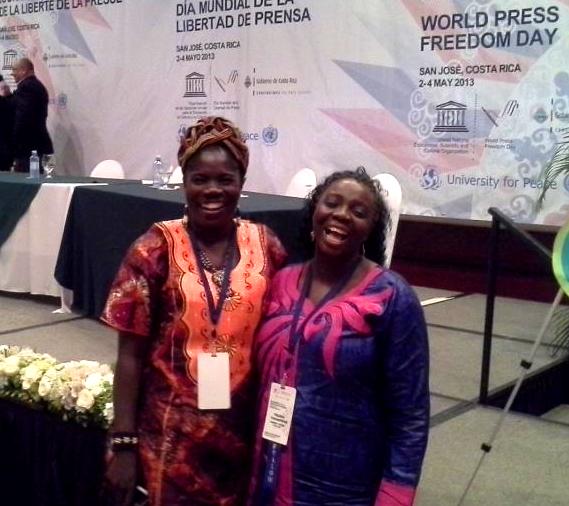JHR Sierra Leone Country Director Yeama Thompson (right) with Liberian journalist Mae Azango
More journalists are dying in the line of work: 121 in 2012, to be precise. It’s a number that has doubled in the past two years. In solidarity, UNESCO made the theme of this year’s World Press Freedom Day conference “Safe to Speak” – a three-day conference brainstorming ways to implement the UN’s newly minted Media Plan of Action and safeguard the right to freedom of expression.
An editor at Freetown’s Daily Mail newspaper during Sierra Leone’s civil war, Yeama Thompson is now the country director for Journalists for Human Rights in Sierra Leone. As a 2012 UNESCO IREX fellow at the conference, she spoke about the particular dangers women journalists face in Sierra Leone – one of the toughest countries on earth in which to work as a female journalist. “Even though Sierra Leone can now boast of a near peaceful situation, women and in particular female journalists remain under threat,” Yaema explained. “More needs to be done in order to secure the future of women and girls – and media, and media training, is a great place to start.”
The perils are real. Also on Yeama’s panel was Prof. Anthony Feinstein of the University of Toronto. He explained that women journalists experience rates of depression and post-traumatic stress considerably higher than their male counterparts. (When factoring out sexual harassment, the rates even out.) In Sierra Leone, the issues are acute. Yeama told the story of one of her colleagues, Manja Baliyma Samba, who works for the public broadcaster in Kenema, Eastern Sierra Leone, where secret societies hold immense power. “For speaking out against Female Genital Mutilation,” Yeama explained, “Manja was stripped naked by the secret society and publicly humiliated.” This threat of violence extends from women in the media to women across the country. Yeama cited the 2012 Report from Action Against Armed Violence, an international NGO. It clearly shows that while levels of physical violence for the general public are decreasing in Sierra Leone, for women, issues of gender-based violence, threats and insecurity remains a top concern.
JHR’s programming in Sierra Leone is designed to build strong women leaders in media, and in so doing, tackle these issues head on. Last year, JHR trainer Andrew Ewoku worked with Aissata Kamara, the Oprah Winfrey of Sierra Leone’s north, on a story about wife beating that outraged the district. Result? The tribal council is now enforcing the country’s Domestic Violence Act – through traditional courts.With the support of Canada’s Donner Foundation, the Canadian International Development Agency, BBC Media Action and the European Union’s Instrument of Democracy and Human Rights, Journalists for Human Rights is creating positive change to ensure that women in the media and gender issues are prioritized in Sierra Leone, and that the culture of silence is broken. However, financing for JHR’s program in Sierra Leone ends in June.
To support Yeama and JHR’s work in Sierra Leone, visit our donate page.



